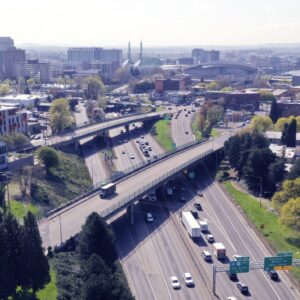The Portland City Council unanimously passed a resolution today making the bicycle industry a recognized and targeted part of our economy.
Mia Birk, principal at Alta Planning and Design (and former Bike Program manager for PDOT) presented her firm’s recent research to Mayor Potter and Commissioners Adams, Leonard, Sten and Saltzman.
Lining up to testify and show support of this resolution were myself, Bike Gallery owner Jay Graves, Bill Stites of Stites Design, BTA Director Evan Manvel, the CCC’s new Director of Development and Communications Alison Hill, and Chris Smith from Portland Transport.
It was an important day because we weren’t their to lobby for new bike infrastructure or to oppose anti-bike policies. Instead, the Mayor and Commissioners listened to our testimony about the importance of fostering bicycle-related industry in Portland.
While it may not be as fun as Pedalpalooza or naked bike rides, getting bikes on the map as an economic “target industry” is a very big deal.
I liked Chris Smith’s testimony. He encouraged the Council to consider the potential of positioning Portland as the place for the bicycle industry given the realities of Peak Oil and global warming. Smith realizes that given these issues, the bicycle industry will continue to grow in size and importance and Portland is well positioned to take advantage of this.
I didn’t take great notes, but I remember something Commissioner Saltzman said:
“Let’s take this strength and turn it into an economic asset.”
This is big picture thinking. Nothing against small framebuilders and mom-and-pop bike shops, but we need to complement our innovative bike infrastructure and policies with cutting-edge ideas on how to grow our bicycle-related industry.
Of course we’ll never compete with China for large-scale manufacturing and production, but there’s vast potential in many other areas. We’ve already got the most important ingredient; tons of smart and entrepreneurial bike geeks just waiting for the right place to put their passion.
As I sat in Council Chambers and listened to the testimony, I felt as though we’re at the start of something big and we just took the first of many exciting steps.
[You can get an up-close look at an important part of our local bike-conomy at tomorrow’s bike show at City Hall. In addition to one of our largest local bike companies, you can meet and view the work of nine local bike builders and a bevy of bike artists.]









Thanks for reading.
BikePortland has served this community with independent community journalism since 2005. We rely on subscriptions from readers like you to survive. Your financial support is vital in keeping this valuable resource alive and well.
Please subscribe today to strengthen and expand our work.
I don’t agree that we’ll never compete with China. Two things are going to happen over time:
1) Chinese wages will go up their standard of living rises.
2) Transportation costs will increase and it won’t be as economical to ship a bike frame from China to the U.S.
At some point there is the possibility that local manufacture will again be economic.
Thanks for chiming in Chris. I didn’t remember exactly what you’d said about China in your testimony.
But wow…Compete with China for bike frames and parts? I don’t think anyone in the bike industry has even considered that yet.
Doing business over there has become second nature for U.S. companies.
But I guess you’re right, given those factors it just might. When it does, it would be great if Portland is lying in wait as the obvious place to do bike business.
Any guess-timates on when we’ll start to see a shift away from China?
Do you see this as a radical shift or something that happens gradually?
Seems like an exciting accomplishment so thanks for the work and also in reporting the development.
Jonathan, you wrote, “…getting bikes on the map as an economic “target industry” is a very big deal.” Why is this so? Beyond the designation on paper, so to speak, how is this going to help the bicycle-related industry on the streets? How does it encourage growth? I imagine subsidies could be involved. Do you know of any details regarding this?
Is it going to be a radical or gradual shift? That’s an interesting question. Given our society’s tendency to procrastinate whenever possible, I suspect that at some point there is going to be a radical shift nationwide in just about all aspects of daily life for the typical American. The realists/pessimists out there don’t think that “civilization” would continue. They’re right if we keep sitting on our rears and do nothing while waiting for our federal government to make a move.
Thing is, Portland is home to quite a few atypical Americans. Could we also be atypical as a region in planning ahead for the coming changes? I already see gradual shifts in other aspects of life like small-time food production, reusing what others discard, etc. Are there business-minded people out there who are far-seeing enough to start being proactive in changing the local economy? If so, I think the bicycle industry would be a wonderful place to begin.
Regarding Chris’ arguments re: competing with China: We may see rising transportation costs cut the margin of outsourcing manufacturing. I won’t hold my breath waiting for China’s wages to reach parity with ours. Average wages in China are just now topping $1/day…this in a country with 1.2 billion people itching for work. Their standard of living is rising dramatically, but a ten-fold wage increase still nets a Chinese worker about $10/day. We won’t see a “shift away from China” for a long, long time.
Portland’s strength will be in providing niche or boutique manufacturing.
It is not only about wages. A Walmart can get a bike (or 1000’s of bikes) in China for 8 dollars. We can’t get the raw materials for that. Bad enviromental law and state owned power help hold price of goods for China down.
I don’t have a prediction on when it will be cheaper to build a bike frame here than import it from China (it could be a very long time). But what I would suggest is that we think about structuring an industry here that can flexibly incorporate various levels of integration as global economics shift.
Who knows what will happen? Portland would be wise to become a magnet for bicycling businesses in case conditions ever do change. Expensive oil, Chinese military aggression somwhere, a patriotic “Buy American” movement, etc. could play into our hands.
Don’t fret over the “Walmart Bike” biz. There are plenty of manufacturers of higher end bikes and components that might relocate to Oregon with the proper mix of economic incentives, skilled workforce, and bike culture. Think Trek, not Huffy.
This is great news. Personally, I would like to see Portland position itself as a city specializing in the “Sustainability Business” for want of a better term for it. There will be an increasing demand for products that encourage less consumption, like bicycles and our city seems to be a hub of that kind of activity already, so kudos to the City Council for adding to the momentum.
RE: China – I think Chris is on to something. There are major changes occuring there that could very well change the bike business as we currently know it. Car ownership is skyrocketing and they are ramping up auto manufacturing to meet an increasing demand. China has a goal to build over 50,000 miles of expressways in the next 10-15 years or so. The US has about 45,000 miles of Interstate highways, in comparison. Meanwhile, Shanghai is closing streets to bicycles to improve(?) congestion and move auto traffic more smoothly. It seems they are disinvesting in bicycles in favor of cars. Unless, I’m wrong, China has typically been the world’s largest bicycle market as well as it’s largest manufacturer. There’s a fascinating article in last Sunday’s NY Times magazine covering this, if you want to know more.
Erik asked:
Great question.
I had a good conversation with Maria Thi Mai today. She’s the Senior Policy Director for Sam Adams.
At this point, the City is trying to figure out the best next steps to take. Some ideas we discussed could be bike-industry friendly land use and zoning designations, special partnerships with local banks for good loans, forming industry alliances, holding town hall forums, etc…
Basically at this point, she’s asking the community what the City can do to help bike businesses grow.
I’m going to have another meeting with her to get more details and I’ll definitely be writing more about this topic in the future.
As someone with well over a decade in the bicycle business, I’ll echo what so many of my customers tell me: the best way to make Portland more friendly for bicycle businesses is to keep working at making riding conditions safer for Portland’s bicyclists, whether they ride for transportation, pleasure or competition.
It’s good to promote bicycle-based businesses as an integral part of growing Portland’s economy. But the fact is that the bicycle retail and manufacturing sectors don’t employ THAT many people in this town: only a few hundred (in a city of over half a million people) are lucky enough to work in the bicycle business in some way.
What bicycle retailers and manufacturers really need is a sizeable critical mass of people who want to ride bikes, and who feel safe enough to do so on city streets and suburban roads. That’s the truest bottom line for most of my customers, and it should continue to be Portland’s bottom line as we plan for our city’s growth in the future. Bicycle-based companies can be an important part of promoting and supporting the necessary planning for future cityscapes that invite bicycling; but ultimately it’s going to be up to developers, planners, elected officials and voters to make a bicycle-friendly landscape a reality.